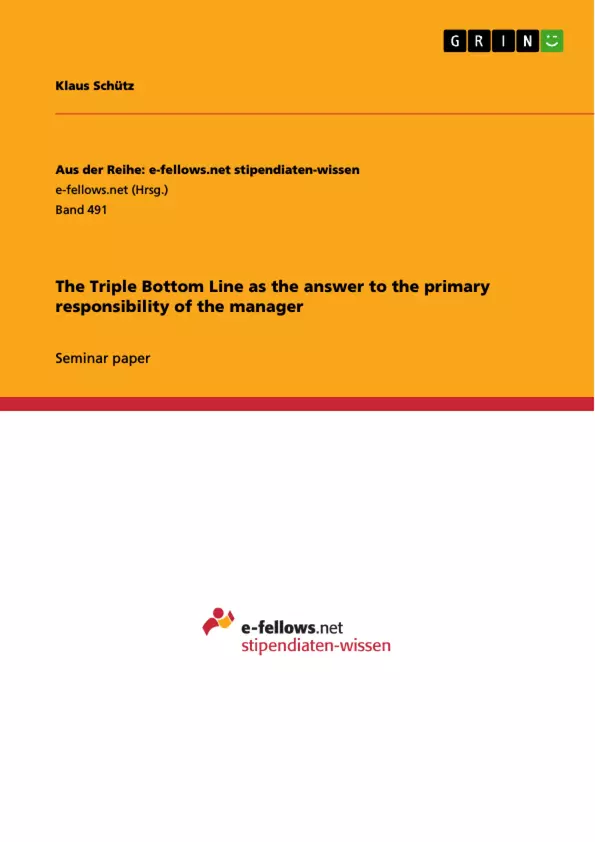What is the primary responsibility of a manager? This question is an old one. However, in the light of several incidents in recent years - some examples are the financial crisis, the BP oil spill and the Enron scandal - it seems to be a more a present-day problem than ever before. The traditional answer to it is also mirrored in business law and states that managers are agents of the stockholders and work solely for their benefit. This view is commonly referred to as the stockholder view. The contrary position to this is the stakeholder view. It asserts that in addition to stockholders, managers have also a fiduciary duty to employees, customers and other stakeholders, including the stockholders. In this paper, arguments both for and against each view will be presented. It will also be claimed that acting in strict accordance to one of the theories is an inappropriate way of managing a company, for ethical and practical reasons. Rather, the opposing views do not necessarily exclude each other. A synthesis of the two contrasts is not impossible, as it can be seen in the recently developed concept of the Triple Bottom Line.
Inhaltsverzeichnis (Table of Contents)
- Introduction
- The Stockholder Theory
- The Stakeholder Theory
- The Triple Bottom Line
- Conclusion
Zielsetzung und Themenschwerpunkte (Objectives and Key Themes)
This paper examines the primary responsibility of managers, exploring the contrasting perspectives of the stockholder and stakeholder theories. The author argues against the exclusive application of either view and advocates for a synthesis through the Triple Bottom Line framework. This analysis seeks to provide a nuanced understanding of managerial obligations in a complex and dynamic business environment.
- Managerial responsibility
- Stockholder vs. stakeholder theory
- Corporate social responsibility (CSR)
- The Triple Bottom Line concept
- Ethics and moral considerations in business
Zusammenfassung der Kapitel (Chapter Summaries)
The introduction sets the stage for the paper by highlighting the relevance of the question of managerial responsibility in light of recent corporate scandals and the financial crisis. It presents the traditional stockholder view, which emphasizes maximizing shareholder wealth, and the alternative stakeholder view, which acknowledges the fiduciary duty to a broader range of stakeholders.
The chapter on the Stockholder Theory delves into the arguments of Milton Friedman, a prominent advocate for this perspective. Friedman asserts that the sole responsibility of business is to increase profits, within the bounds of ethical and legal practices. This chapter analyzes the advantages and disadvantages of the stockholder view, including its potential to benefit stakeholders beyond shareholders and its economic rationale.
Schlüsselwörter (Keywords)
The main focus of this paper is on the concept of the Triple Bottom Line, which aims to balance economic, social, and environmental considerations in business decision-making. Key themes explored include managerial responsibility, stakeholder engagement, corporate social responsibility, and ethical considerations in a globalized economy.
Frequently Asked Questions
What is the "Triple Bottom Line" concept?
The Triple Bottom Line is a framework that encourages managers to focus not only on profits (economic) but also on social and environmental impacts.
What is the difference between stockholder and stakeholder theory?
Stockholder theory asserts that managers work solely for the benefit of owners, while stakeholder theory argues they have a duty to employees, customers, and the community as well.
What was Milton Friedman's view on corporate responsibility?
Friedman famously argued that the only social responsibility of business is to increase its profits within the rules of the game.
Why is the Triple Bottom Line considered a synthesis?
It reconciles the need for financial success with ethical obligations, showing that economic and social goals do not necessarily exclude each other.
How do incidents like the BP oil spill affect the debate on management?
Such scandals highlight the dangers of focusing exclusively on short-term profits and emphasize the need for broader corporate social responsibility.
- Quote paper
- Klaus Schütz (Author), 2011, The Triple Bottom Line as the answer to the primary responsibility of the manager, Munich, GRIN Verlag, https://www.grin.com/document/198659



